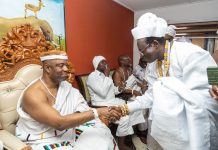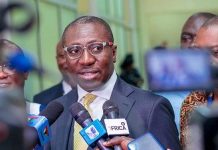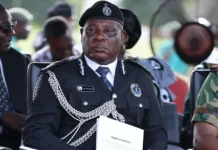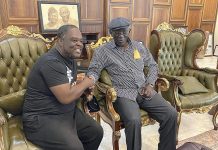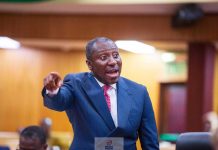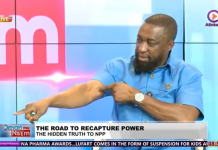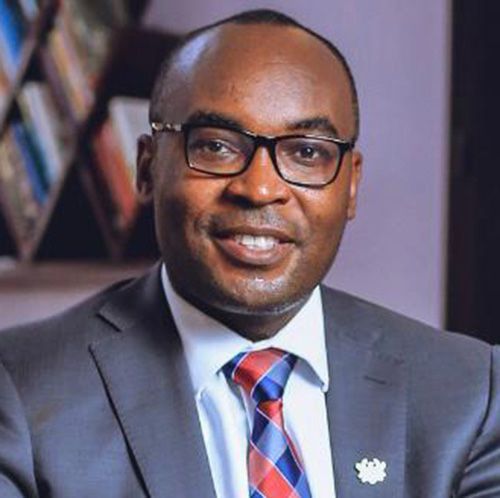As Kwame Nkrumah once declared, “The independence of Ghana is meaningless unless it is linked up with the total liberation of the African continent.”
Today, that liberation must extend into the digital realm—a realm that is fast becoming the very foundation of our economic, social, and cultural lives.
Now, consider the current state of Africa’s digital landscape. Despite being home to 1.4 billion people, our digital markets remain fragmented.
We see exorbitant data costs, inefficient infrastructure, and regulatory discord that stifles innovation and keeps our people from realizing their full potential. And yet, there is a clear and powerful example in our midst—Ghana.
Ghana has, over the past decade, made remarkable strides in digitalization. Our nation has not only embraced mobile technology and digital financial services—earning accolades from international organizations like the World Economic Forum and the International Telecommunication Union—but has also become a beacon for digital progress in West Africa.
Accra, for instance, is increasingly recognized as a hub of innovation, where startups flourish and digital initiatives are transforming lives.
Ghana has successfully deployed biometric digital identity system, a digital address system, and a total annual fintech transactions of more than 3 trillion cedis.Ghana is now the first in global mobile money regulation in the world, and many more.
These achievements, however, are only the beginning.
With five years to go until 2030, the jury is still out on Africa’s Vision 2030 on digitalization.
The official documents emphasize a “United” digital Africa—a call for the continent to come together. But if we examine our challenges more closely, the keyword moving forward should not merely be “United.”
Instead, it must be “Unified.” United implies that separate entities are joining forces, yet Unified suggests an integrated, harmonized, and deeply coordinated system that leaves no part of our digital economy operating in isolation.
In order to truly break the chains that hold back our development, Africa must adopt a Unified digital strategy—one that binds together telecom infrastructure, policy frameworks, financial systems, and even our very identities.
Now, let me be clear: these successes in Ghana, as impressive as they are, must serve as the catalyst for something much larger.
Ghana must now lead the charge in creating a Pan-African Digital Market.
The idea is simple yet profound: by unifying our telecom infrastructure, harmonizing digital policies, building robust infrastructure, integrating our financial systems, and forging a unified African identity, we can force down data costs across the continent. This is not merely an economic imperative—it is a moral one.
Consider the example of India, which, through fierce market competition and visionary policy reforms, reduced data costs by over 90% in just a few short years.
Their approach wasn’t accidental; it was a deliberate, strategic effort to unleash the transformative power of affordable data.
Let’s put this into perspective:The average cost of 1GB of data in Ghana is around $2.17, while in India, it’s $0.10 per GB—20 times cheaper! Despite Africa having 1.4 billion people, our telecom sector is divided into 54 tiny, inefficient markets, each with its own expensive infrastructure, policies, and pricing structures. Instead of using our massive population as leverage, we allow iur physical borders to dictate digital economy.
Ghana, with its stable political climate, progressive digital policies, and burgeoning tech ecosystem, is uniquely positioned to do what India did—but on a Pan-African scale.
Let’s break down what this means:
1. A Continental Telecom Enterprise: Ghana must champion the creation of Africa’s first truly cross-border telecom provider. Imagine a company that operates seamlessly throughout Africa, enabling an entrepreneur in Accra to serve a customer in Lagos or Nairobi without the friction of exorbitant data charges. This bold initiative will not only drive down costs through sheer scale but also keep digital profits within the continent.
2. Unified Digital Policy: Under the auspices of frameworks like the African Continental Free Trade Agreement (AfCFTA), Ghana can help establish a single regulatory framework for telecom and digital services. By eliminating intra-Africa data roaming fees and harmonizing spectrum allocation, we can create a digital marketplace that is both efficient and equitable. Such unity is essential if we are to truly liberate our digital economies.
3. Digital Infrastructure Revolution: Ghana has already demonstrated its capacity to lead in infrastructure development—from the pioneering days of the Akosombo Dam to the current rollout of fiber optics and mobile money systems. It’s time to build on that legacy by spearheading a continent-wide digital infrastructure revolution. Investments in 5G networks, expansive fiber-optic grids, and cross-border connectivity projects will form the bedrock upon which our digital future is built.
4. A Pan-African Payment Platform of Central Banks: In today’s digital economy, financial integration is crucial. We must not relent on the expansion of the unified Pan-African Payment Platform, coordinated by central banks across the continent. Imagine a system where the continent’s financial institutions—united in purpose—enable instantaneous, secure, and cost-effective transactions across borders.
This would not only reduce the friction and cost associated with cross-border payments but also bolster economic integration, enhance trust in digital transactions, and ultimately empower entrepreneurs and consumers alike. Ghana’s pioneering work in mobile money and digital financial services provides the perfect blueprint for this audacious initiative of an active and unified Pan African payment plan.
5. A Unified African Identity Platform: Identity is the cornerstone of civilization and the bedrock upon which trust and community are built. In our fragmented digital landscape, African citizens often find themselves divided by national borders and disparate systems of identification. To forge a truly unified digital Africa, we must establish a Pan-African Identity Platform.
This platform would integrate biometric, governmental, and financial identification systems into a single, secure digital identity for every African citizen.
Not only would such a system streamline access to digital services and reinforce cybersecurity, but it would also foster a profound sense of shared belonging and collective destiny.
In essence, a unified African identity platform would affirm that every citizen—regardless of the nation in which they reside—is a valued member of the pan-African community.
This is more than a technological necessity; it is a moral imperative that strengthens our cultural and social bonds across the continent.
There is a psychological truth underpinning this entire argument: we are creatures who thrive on order, structure, and unity. When a society is fragmented, its people feel powerless. But when unity is achieved—when there is a coherent, collective vision—human potential is unleashed. Ghana’s progress in digitalization is not just a point of national pride; it is a clarion call for the rest of Africa to rise and seize its digital destiny.
Make no mistake, the stakes are high. If we do not act now, Africa risks remaining in a state of digital dependence—where expensive data and foreign-controlled tech ecosystems hold us hostage. But if Ghana steps forward as the leader in this digital liberation, we can chart a course toward an Africa where digital independence is not only attainable but transformative.
In the end, our struggle is not solely about technology or economics—it is about reclaiming our dignity, our agency, and our future. Ghana’s independence in 1957 was merely the first step. Now, inspired by the visionary spirit of Kwame Nkrumah and buoyed by our digital achievements, it is time for Ghana to lead the charge toward a liberated, united, and above all, Unified digital Africa.
Remember: a connected Africa is not just a practical necessity—it is the next frontier of our collective freedom. And it is incumbent upon us to ensure that this freedom is realized, not just for a few, but for all.
History does not wait. Africa will either seize this moment and build its own digital future, or we will be forced to accept one designed for us by others.
The time for debate is over. The time for action is now. Ghana must rise again—not just as the first to gain independence, but as the first to build a United, Unified Digital Africa.
Because a connected Africa is a free Africa. And a free Africa is a powerful Africa.
By Dr Augustine Blay, Secretary to HE Dr Mahamudu Bawumia.
Ghana l Atinka online.com


